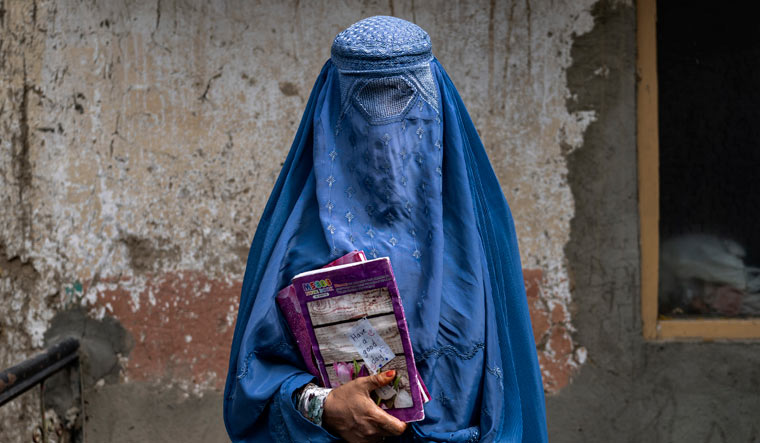UNSC Deeply Concerned Over Ban On Afghan Women In Unis, NGOs
Dec 28, 2022 | Pratirodh Bureau
A 40-year-old Afghan woman leaves an underground school in Kabul, Afghanistan (AP)
(Source: PTI)
The UN Security Council, under the current presidency of India, has voiced concern over restrictions on women and girls’ education and work imposed by the Taliban in Afghanistan, calling for a swift reversal of these policies which increasingly eroded respect for human rights.
The Taliban have banned women from attending university and working for non-governmental organisations (NGOs) last week.
Since seizing back control of the war-torn country in August last year, the Taliban have steadily restricted women’s rights — despite promising their rule this time would be softer than the regime seen in the 1990s.
India’s Ambassador to the UN and currently the UNSC President for the month of December, Ruchira Kamboj, issued a press statement on Tuesday on behalf of the 15-nation Council that said that its members are deeply alarmed by reports that the Taliban have suspended access to universities for women and girls.
The Council reiterated its “deep concern over the suspension of schools beyond the 6th grade, as well as its call for the full, equal, and meaningful participation of women and girls in Afghanistan. It called on the Taliban to reopen schools and swiftly reverse these policies and practices, which represents an increasing erosion for the respect of human rights and fundamental freedoms.
The members are furthermore “profoundly concerned” by reports that the Taliban have banned female employees of NGOs and international organisations from going to work, which would have a “significant and immediate impact” on humanitarian operations in the country, including those of the UN and the delivery of aid and health work, the statement said.
It said these restrictions contradict the commitments made by the Taliban to the Afghan people as well as the expectations of the international community.
India’s current Presidency of the Council and its two-year UNSC tenure end on December 31.
During India’s Presidency of the Security Council in August last year, the Council adopted resolution 2593 that had set forth expectations of the international community regarding Afghanistan, including ensuring that the territory of the country is not used to launch terrorist attacks against other nations; formation of a truly inclusive and representative government; combating terrorism and drug trafficking; and preserving the rights of women, children, and minorities.
UN Secretary-General Antonio Guterres had last week said he is deeply disturbed by the reported order of the de facto Taliban authorities banning women from working for national and international non-governmental organisations.
This decision will undermine the work of numerous organisations working across the country helping those most vulnerable, especially women and girls, a statement issued by his spokesperson said.
It noted that the UN and its partners, including national and international non-governmental organisations, are helping more than 28 million Afghans who depend on humanitarian aid to survive.
The effective delivery of humanitarian assistance requires full, safe and unhindered access for all aid workers, including women.
The reported ban on women working with the international community to save lives and livelihoods in Afghanistan will cause further untold hardship for the people of Afghanistan, Guterres had said, reiterating that the rights of all women to participate in the workforce contributed to the greater good.
UN Women Executive Director Sima Bahous said in a statement that the de facto authorities of Afghanistan have once again found new ways to harm the women and girls of Afghanistan.
As the world remains outraged by recent decisions to ban women and girls from higher education, the decree barring women from working in national and international NGOs is yet another stark violation of women’s rights and humanitarian principles, she said.
We strongly condemn this without reservation, Bahous said. “This is relentless misogyny, a virulent attack on women, their contribution, their freedom, and their voice. It is yet another repudiation of every norm and standard of women’s human rights and respect for human dignity.”
The Security Council reiterated its full support to the Special Representative of the Secretary-General for Afghanistan Roza Otunbayeva and the UN Assistance Mission in Afghanistan (UNAMA) and the importance for Otunbayeva to carry out her mandate, including monitoring and reporting on the situation, and continued engagement with all relevant Afghan political actors and stakeholders, including relevant authorities, on these issues, consistent with the mandate of UNAMA, and keeping the Security Council informed on the progress.
Bahous said that in barring women from contributing to the efforts of aid organisations, the Taliban suspended aid for half the population of Afghanistan, “aid that they depended on and without which they will not survive.”
She said 11.6 million women and girls are no longer receiving vital assistance. Women-headed households, which make up almost a quarter of households in Afghanistan, have nowhere left to turn and no livelihood support.
Many national and international NGOs are unable to operate without their female staff, Bahous said, adding that all services for women are impacted including their access to water, sanitation, hygiene, protection, mobile health, food, shelter, and livelihoods.
The consequences of this are further increasing the vulnerability of women and girls already at risk, as services for survivors of violence or to prevent sexual exploitation and abuse are shut down.
Thousands of children and families who depended on the income that women delivering humanitarian assistance brought in are now even more destitute, the UN Women chief said.
